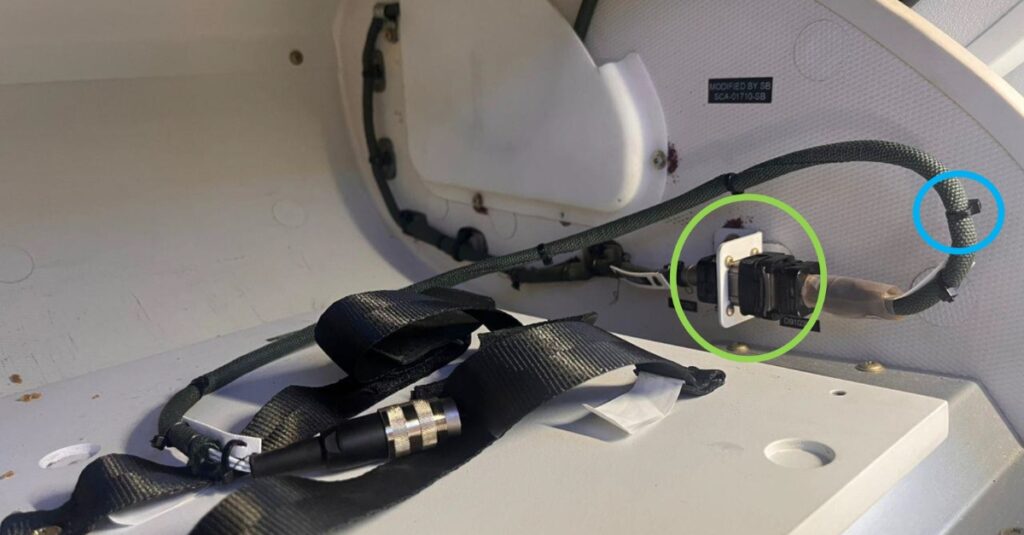


As wireless in-flight entertainment (W-IFE) continues to evolve as a must-have passenger experience feature, airlines are faced with a critical decision: how to power their standalone onboard servers. These servers, often located in the overhead bins (OVHB), are an affordable and effective way to bring digital services onboard without the need for embedded seatback screens.
Two strategies are typically used to activate these servers: battery-powered or aircraft-powered. While battery-powered servers may seem like a quick and cost-effective solution, real-world operational experience shows that they often fall short. Here’s why aircraft-powered servers are the smarter long-term investment.
To maximize return on your IFE investment, passenger engagement is key—and that begins with system availability on every flight. Unfortunately, battery-powered servers are highly vulnerable to human error:
– Batteries may not be charged correctly or consistently.
– Cabin crew may not activate the system due to unclear procedures or lack of training.
– Standard operating procedures are often inconsistently followed.
In contrast, aircraft-powered servers, enabled from gate to gate, ensure 100% platform availability—automatically activating at power-up with zero crew intervention. This guarantees a seamless passenger experience every time.
While battery-powered servers may seem cost-effective upfront, their ongoing operational costs can quickly become unsustainable:
– Manual battery charging and swapping require dedicated resources at each hub.p
– For fleets of more than five aircraft, this becomes a daily logistical challenge, adding staffing costs or increasing reliance on third-party fulfillment providers.
– Battery replacement is needed every 24 to 30 months, adding significant CAPEX and environmental burden.
– Improper handling leads to physical damage, often voiding warranty coverage under “Customer Induced Damage” (CID).
By contrast, aircraft-powered systems eliminate daily maintenance, streamline logistics, and extend equipment lifespan.-
Though battery-powered systems meet FAA and EASA safety standards, growing concerns from local Civil Aviation Authorities (CAAs) around lithium-ion batteries—especially as loose items—are prompting more scrutiny. Additionally, poor handling practices raise the risk of undetected cell damage.
Aircraft-powered systems completely sidestep these concerns, aligning with increasingly stringent safety policies.
Aircraft-powered servers are better suited for Over-the-Air (OTA) updates. Thanks to 4G/5G-based smart algorithms, these servers can detect flight phases and maximize update opportunities during ground handling.
The result?
– Efficient content updates with minimal data overhead
– Faster deployment of promotions, new features, or critical bug fixes
– Lower operational costs with greater responsiveness
This ensures that your IFE content remains fresh, relevant, and monetizable.
For some regulators, particularly in Europe and Asia-Pacific, approval for W-IFE systems depends on a wired PA Pause. This ensures that any announcement from the cockpit or cabin crew interrupts media playback onboard.
Battery-powered servers rely on acoustic sensors to detect announcements, but since these servers are often enclosed in the overhead bin, sensor performance can be limited. Aircraft-powered installations, however, can be equipped with wired or Bluetooth dongles to ensure full compliance, offering a more robust solution aligned with CAA requirements.
As a conclusion, as much as battery powered is suitable for a few weeks/months testing on a reduced number of aircraft, having an aircraft-powered architecture is the insurance of a solid groundwork to start your inflight digital platform monetization : a good audience is the very first mandatory asset enabling effective ancillary revenues generation.
*OTA = Over The Air
TRAVELER’S MICRO-MOMENTS Home Capturing the Traveler's Micro-Moments 26 April 2022 microMoments, Technology, traveler Time Is No Longer Measured in Days,…
IFE TO THE RESCUE Home WHEN IFE COMES TO THE RESCUE OF FLIGHT ATTENDANTS! 25 June 2022 Digital Services, IFE,…
Digital AD: IVT-FREE Zone Home DIGITAL INFLIGHT ADVERTISING: AN IVT-FREE ZONE 20 May 2022 Advertising, IVTFREE, Technology In late 2015,…